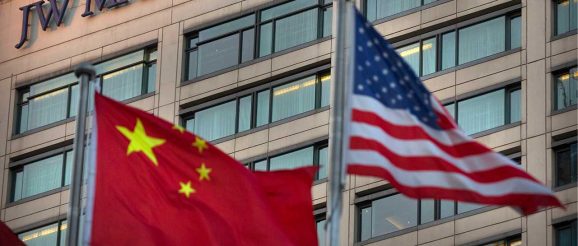In the Innovation Race Against China, Will the U.S. Win or Lose?

While the U.S. competition with communist China on the economic, military, and diplomatic fronts plays out on the front pages of the world’s newspapers, we’re in another competition with Beijing that’s only covered in the back pages, if at all – our competition with Beijing on the intellectual property front. And if our government fails to recognize and acknowledge that, and address that competition properly by taking corrective action soon, the era of American domination will end.
That’s the stark warning of a new, award-winning documentary, “Innovation Race: There Is No Prize for Second Place.”
China expert Gordon Chang lays out the stakes of this under-the-radar competition simply: “This is a race we cannot afford to lose,” he says, “because we’re not going to have a country if we lose.”
For decades, communist China has simply stolen U.S. intellectual property. Brig. Gen. Robert Spalding, III (USAF Ret.), explains that the Department of Justice has valued the loss of American intellectual property to Chinese theft at approximately $600 billion per year – what FBI Director Christopher Wray has declared as “the largest transfer of wealth in human history.”
Communist China doesn’t confine itself to outright theft. Forced technology transfer is also a feature of doing business there. Explains Adam Mossoff, professor at the Antonin Scalia Law School at George Mason University, “If you want to do business in China, you can’t do business directly in China as a U.S. company … you have to work through a Chinese company. And by working through a Chinese company, you have to enter a new agreement with them. And China requires disclosure and transfer of all your intellectual property to that Chinese company. Sometimes, ALL of your intellectual property, not even just the intellectual property that covered the particular product that that Chinese company might be helping you manufacture in their country.”
Stealing and forced handover of intellectual property can only get you so far. So in recent years, communist China has begun a new effort that could catapult it past the United States and into a permanent lead in the race to control the future. Under Xi Jinping, China has decided to embrace the protection of intellectual property as a means to achieve global dominance.
“China is a paradox sometimes,” Mossoff explains. “They looked at the United States and said that a key feature of what has made the U.S. so successful has been its patent system. China recognized at one point that they wanted to become an innovation economy themselves. They wanted to shift from being a manufacturer and a copier of other people’s innovative products and services to being a source of innovation and creativity themselves.”
“They went from copying our products and services to copying our patent system,” he continues. “They’re really smart. They looked at the United States, and said a key feature of what has made the U.S. so successful has been its patent system. And where reliable and effective property rights are provided, that is where innovation and productive activities occur.”
So China began to bolster its own legal protections for intellectual property. Says Delaware Democrat Sen. Chris Coons, “Now they are directly competing with us – if you look at the number of scientific papers published, the number of Ph.Ds issued, the number of patents issued.“
The result was a huge growth in the number of patents issued in China, as inventors from all over the world sought the Chinese legal protections.
Meanwhile, the U.S. government was handicapping itself in this competition. The 2011 America Invents Act made life tougher for inventors and innovation, by weakening U.S. patent protections and strengthening the hands of those who would try to strip them of their inventions.
The Patent Trial and Appeals Board (PTAB), created by the 2011 law, makes it much easier for patents to be challenged and invalidated. Unlike an Article III court, PTAB has no jury, no discovery, and has much lower rules of evidence – all of which negates due process. As a consequence, the PTAB invalidates a much higher percentage of patents than would be invalidated in a real court. According to Randy Landreneau, President of U.S. Inventor, “Eighty-four percent of the patents that go all the way through the PTAB process get fully or partially invalidated.”
Mossoff says the PTAB has resulted in tens of thousands of patents being invalidated. Inventors have lost control of their property rights, and venture capitalists – those with the capital and the determination to fund innovation – are wary. Says venture capitalist Gary Lauder, “It costs an average of $500,000 to defend your patent at the PTAB.” Coons echoes him: “Patents are not as certain. They are subject to repeated challenges.”
Not surprisingly, more and more inventors are leaving the weaker protections of the current American patent system behind, and taking the trip to China.
Chang is right – this is a race we cannot afford to lose. The way to win is to strengthen patent protection in America so that inventors innovate here with the confidence our government will protect their intellectual property, as laid out in the U.S. Constitution.
The documentary, which has been shown only at select private screenings, will have itspremierein Washington on September 20.
Jenny Beth Martin is Honorary Chairman of Tea Party Patriots Action.
